Classical Piano Learning Journal: 6 Lessons Explored
VerifiedAdded on 2022/11/15
|6
|1410
|471
Journal and Reflective Writing
AI Summary
This assignment is a reflective learning journal from a student detailing six lessons learned in classical piano study. The journal entries cover various aspects of piano learning, including sight reading techniques, the importance of practicing scales, ear training and music theory, mind and finger control, piano pedaling techniques, and the challenges of ensemble playing with the oboe. Each entry reflects on the student's experiences, challenges, and strategies for improvement, referencing relevant resources and insights gained through lessons and practice. The journal demonstrates the student's critical thinking and analytical skills in the context of their musical development, highlighting personal growth and the application of learned concepts.
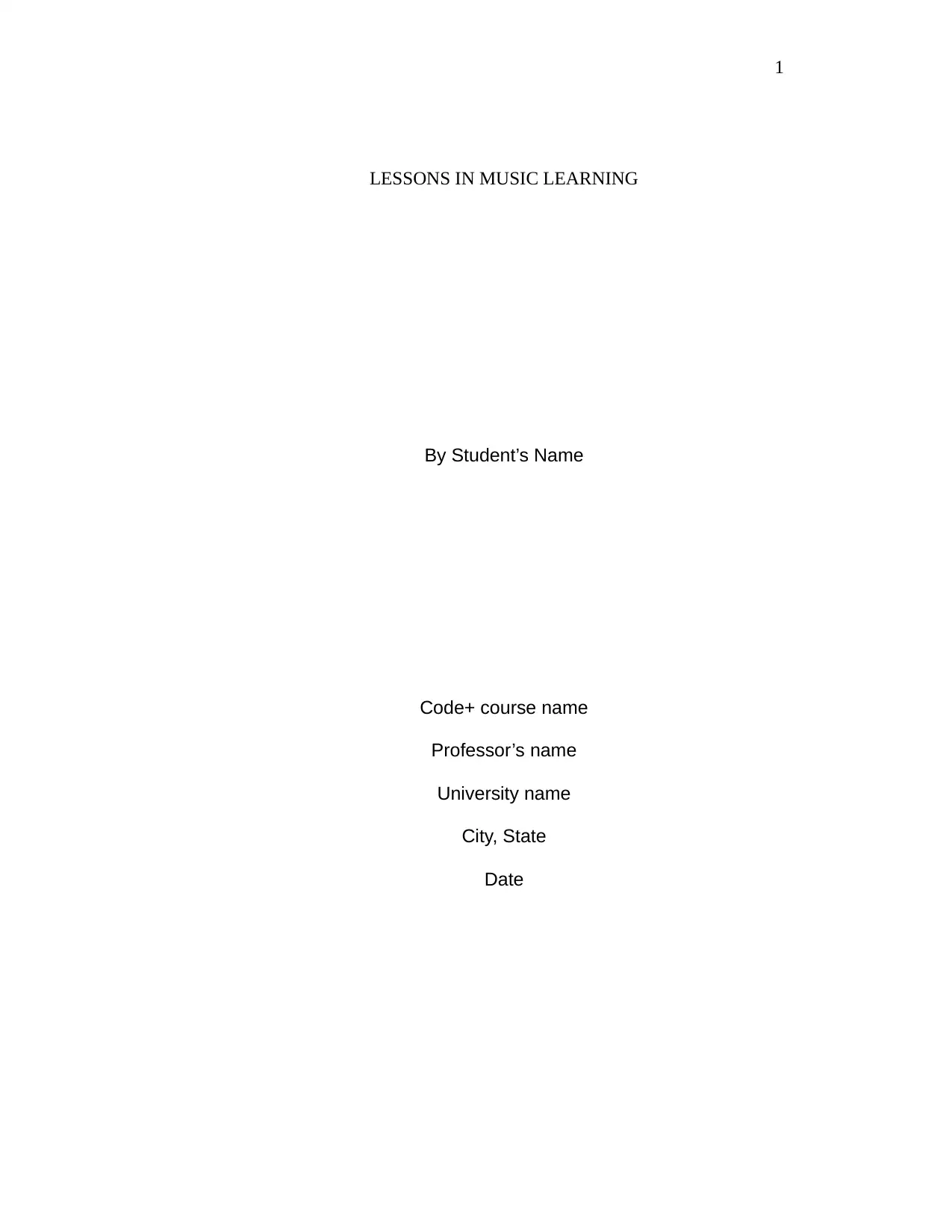
1
LESSONS IN MUSIC LEARNING
By Student’s Name
Code+ course name
Professor’s name
University name
City, State
Date
LESSONS IN MUSIC LEARNING
By Student’s Name
Code+ course name
Professor’s name
University name
City, State
Date
Paraphrase This Document
Need a fresh take? Get an instant paraphrase of this document with our AI Paraphraser
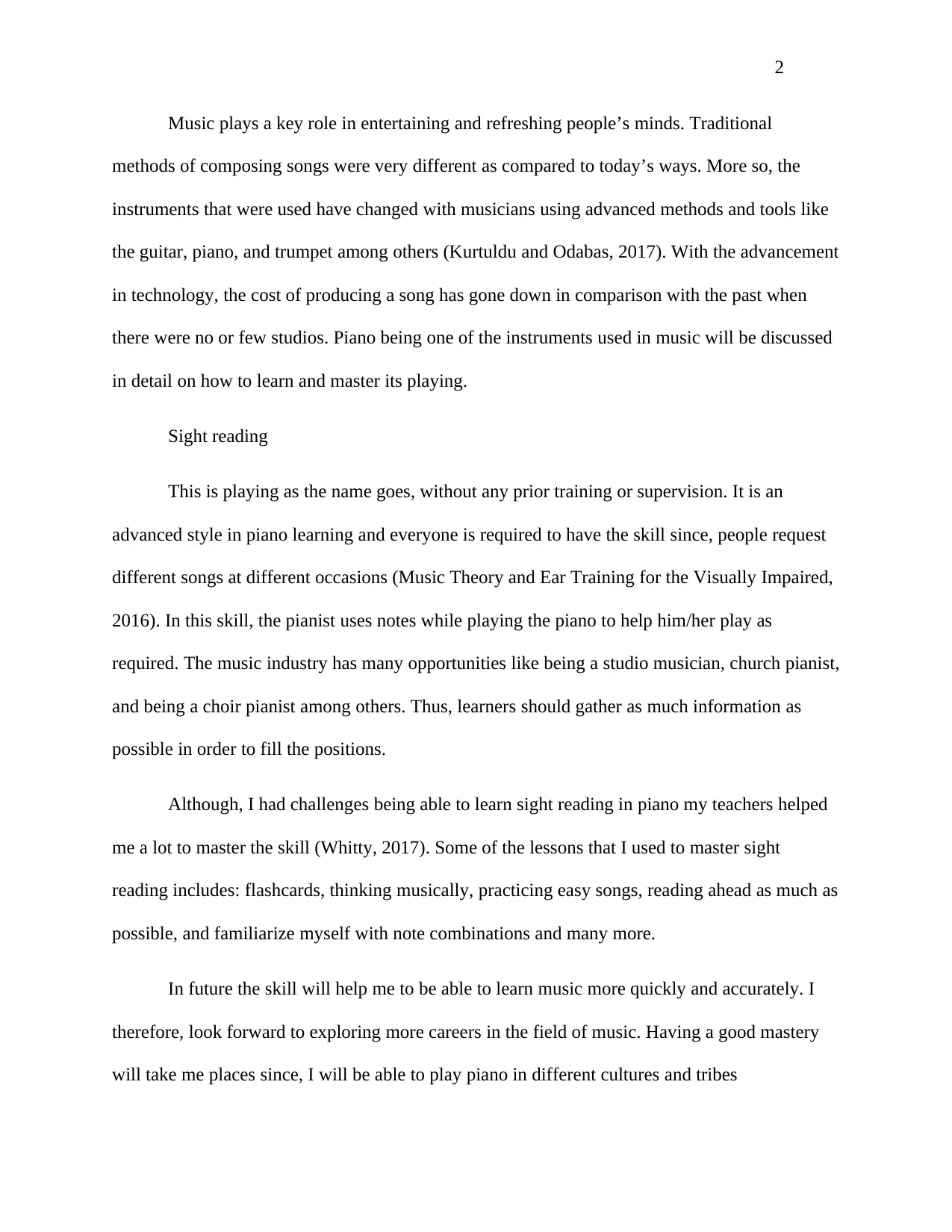
2
Music plays a key role in entertaining and refreshing people’s minds. Traditional
methods of composing songs were very different as compared to today’s ways. More so, the
instruments that were used have changed with musicians using advanced methods and tools like
the guitar, piano, and trumpet among others (Kurtuldu and Odabas, 2017). With the advancement
in technology, the cost of producing a song has gone down in comparison with the past when
there were no or few studios. Piano being one of the instruments used in music will be discussed
in detail on how to learn and master its playing.
Sight reading
This is playing as the name goes, without any prior training or supervision. It is an
advanced style in piano learning and everyone is required to have the skill since, people request
different songs at different occasions (Music Theory and Ear Training for the Visually Impaired,
2016). In this skill, the pianist uses notes while playing the piano to help him/her play as
required. The music industry has many opportunities like being a studio musician, church pianist,
and being a choir pianist among others. Thus, learners should gather as much information as
possible in order to fill the positions.
Although, I had challenges being able to learn sight reading in piano my teachers helped
me a lot to master the skill (Whitty, 2017). Some of the lessons that I used to master sight
reading includes: flashcards, thinking musically, practicing easy songs, reading ahead as much as
possible, and familiarize myself with note combinations and many more.
In future the skill will help me to be able to learn music more quickly and accurately. I
therefore, look forward to exploring more careers in the field of music. Having a good mastery
will take me places since, I will be able to play piano in different cultures and tribes
Music plays a key role in entertaining and refreshing people’s minds. Traditional
methods of composing songs were very different as compared to today’s ways. More so, the
instruments that were used have changed with musicians using advanced methods and tools like
the guitar, piano, and trumpet among others (Kurtuldu and Odabas, 2017). With the advancement
in technology, the cost of producing a song has gone down in comparison with the past when
there were no or few studios. Piano being one of the instruments used in music will be discussed
in detail on how to learn and master its playing.
Sight reading
This is playing as the name goes, without any prior training or supervision. It is an
advanced style in piano learning and everyone is required to have the skill since, people request
different songs at different occasions (Music Theory and Ear Training for the Visually Impaired,
2016). In this skill, the pianist uses notes while playing the piano to help him/her play as
required. The music industry has many opportunities like being a studio musician, church pianist,
and being a choir pianist among others. Thus, learners should gather as much information as
possible in order to fill the positions.
Although, I had challenges being able to learn sight reading in piano my teachers helped
me a lot to master the skill (Whitty, 2017). Some of the lessons that I used to master sight
reading includes: flashcards, thinking musically, practicing easy songs, reading ahead as much as
possible, and familiarize myself with note combinations and many more.
In future the skill will help me to be able to learn music more quickly and accurately. I
therefore, look forward to exploring more careers in the field of music. Having a good mastery
will take me places since, I will be able to play piano in different cultures and tribes
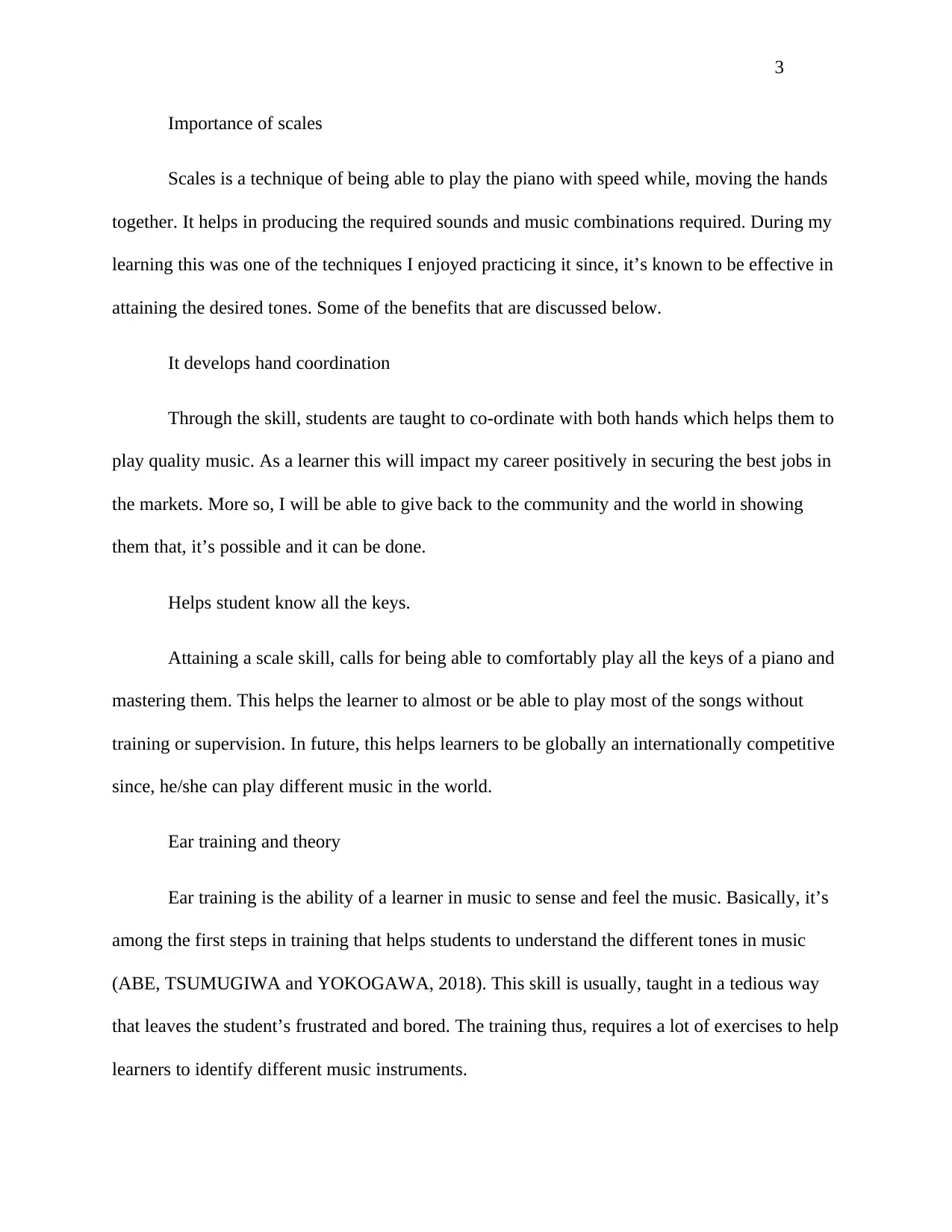
3
Importance of scales
Scales is a technique of being able to play the piano with speed while, moving the hands
together. It helps in producing the required sounds and music combinations required. During my
learning this was one of the techniques I enjoyed practicing it since, it’s known to be effective in
attaining the desired tones. Some of the benefits that are discussed below.
It develops hand coordination
Through the skill, students are taught to co-ordinate with both hands which helps them to
play quality music. As a learner this will impact my career positively in securing the best jobs in
the markets. More so, I will be able to give back to the community and the world in showing
them that, it’s possible and it can be done.
Helps student know all the keys.
Attaining a scale skill, calls for being able to comfortably play all the keys of a piano and
mastering them. This helps the learner to almost or be able to play most of the songs without
training or supervision. In future, this helps learners to be globally an internationally competitive
since, he/she can play different music in the world.
Ear training and theory
Ear training is the ability of a learner in music to sense and feel the music. Basically, it’s
among the first steps in training that helps students to understand the different tones in music
(ABE, TSUMUGIWA and YOKOGAWA, 2018). This skill is usually, taught in a tedious way
that leaves the student’s frustrated and bored. The training thus, requires a lot of exercises to help
learners to identify different music instruments.
Importance of scales
Scales is a technique of being able to play the piano with speed while, moving the hands
together. It helps in producing the required sounds and music combinations required. During my
learning this was one of the techniques I enjoyed practicing it since, it’s known to be effective in
attaining the desired tones. Some of the benefits that are discussed below.
It develops hand coordination
Through the skill, students are taught to co-ordinate with both hands which helps them to
play quality music. As a learner this will impact my career positively in securing the best jobs in
the markets. More so, I will be able to give back to the community and the world in showing
them that, it’s possible and it can be done.
Helps student know all the keys.
Attaining a scale skill, calls for being able to comfortably play all the keys of a piano and
mastering them. This helps the learner to almost or be able to play most of the songs without
training or supervision. In future, this helps learners to be globally an internationally competitive
since, he/she can play different music in the world.
Ear training and theory
Ear training is the ability of a learner in music to sense and feel the music. Basically, it’s
among the first steps in training that helps students to understand the different tones in music
(ABE, TSUMUGIWA and YOKOGAWA, 2018). This skill is usually, taught in a tedious way
that leaves the student’s frustrated and bored. The training thus, requires a lot of exercises to help
learners to identify different music instruments.
⊘ This is a preview!⊘
Do you want full access?
Subscribe today to unlock all pages.

Trusted by 1+ million students worldwide
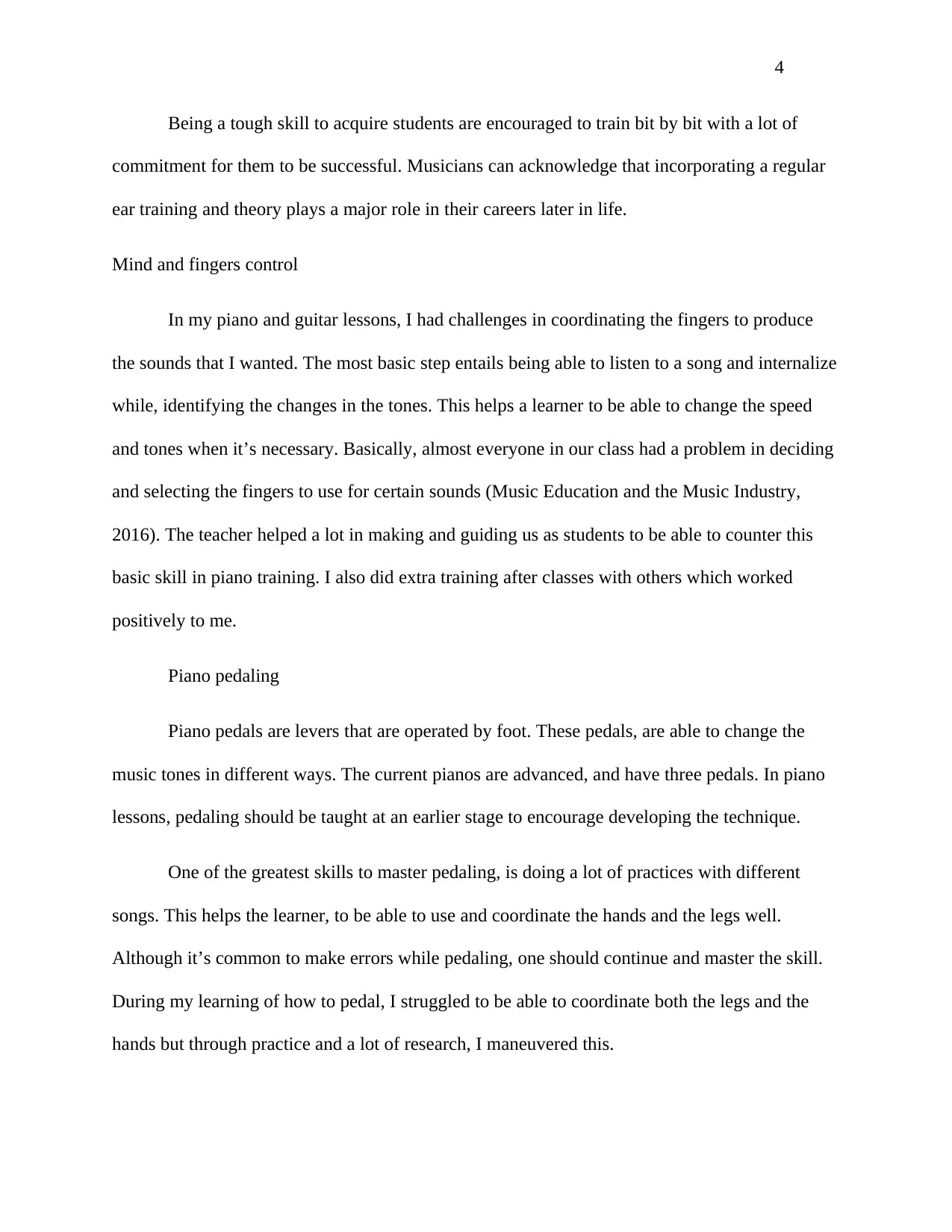
4
Being a tough skill to acquire students are encouraged to train bit by bit with a lot of
commitment for them to be successful. Musicians can acknowledge that incorporating a regular
ear training and theory plays a major role in their careers later in life.
Mind and fingers control
In my piano and guitar lessons, I had challenges in coordinating the fingers to produce
the sounds that I wanted. The most basic step entails being able to listen to a song and internalize
while, identifying the changes in the tones. This helps a learner to be able to change the speed
and tones when it’s necessary. Basically, almost everyone in our class had a problem in deciding
and selecting the fingers to use for certain sounds (Music Education and the Music Industry,
2016). The teacher helped a lot in making and guiding us as students to be able to counter this
basic skill in piano training. I also did extra training after classes with others which worked
positively to me.
Piano pedaling
Piano pedals are levers that are operated by foot. These pedals, are able to change the
music tones in different ways. The current pianos are advanced, and have three pedals. In piano
lessons, pedaling should be taught at an earlier stage to encourage developing the technique.
One of the greatest skills to master pedaling, is doing a lot of practices with different
songs. This helps the learner, to be able to use and coordinate the hands and the legs well.
Although it’s common to make errors while pedaling, one should continue and master the skill.
During my learning of how to pedal, I struggled to be able to coordinate both the legs and the
hands but through practice and a lot of research, I maneuvered this.
Being a tough skill to acquire students are encouraged to train bit by bit with a lot of
commitment for them to be successful. Musicians can acknowledge that incorporating a regular
ear training and theory plays a major role in their careers later in life.
Mind and fingers control
In my piano and guitar lessons, I had challenges in coordinating the fingers to produce
the sounds that I wanted. The most basic step entails being able to listen to a song and internalize
while, identifying the changes in the tones. This helps a learner to be able to change the speed
and tones when it’s necessary. Basically, almost everyone in our class had a problem in deciding
and selecting the fingers to use for certain sounds (Music Education and the Music Industry,
2016). The teacher helped a lot in making and guiding us as students to be able to counter this
basic skill in piano training. I also did extra training after classes with others which worked
positively to me.
Piano pedaling
Piano pedals are levers that are operated by foot. These pedals, are able to change the
music tones in different ways. The current pianos are advanced, and have three pedals. In piano
lessons, pedaling should be taught at an earlier stage to encourage developing the technique.
One of the greatest skills to master pedaling, is doing a lot of practices with different
songs. This helps the learner, to be able to use and coordinate the hands and the legs well.
Although it’s common to make errors while pedaling, one should continue and master the skill.
During my learning of how to pedal, I struggled to be able to coordinate both the legs and the
hands but through practice and a lot of research, I maneuvered this.
Paraphrase This Document
Need a fresh take? Get an instant paraphrase of this document with our AI Paraphraser
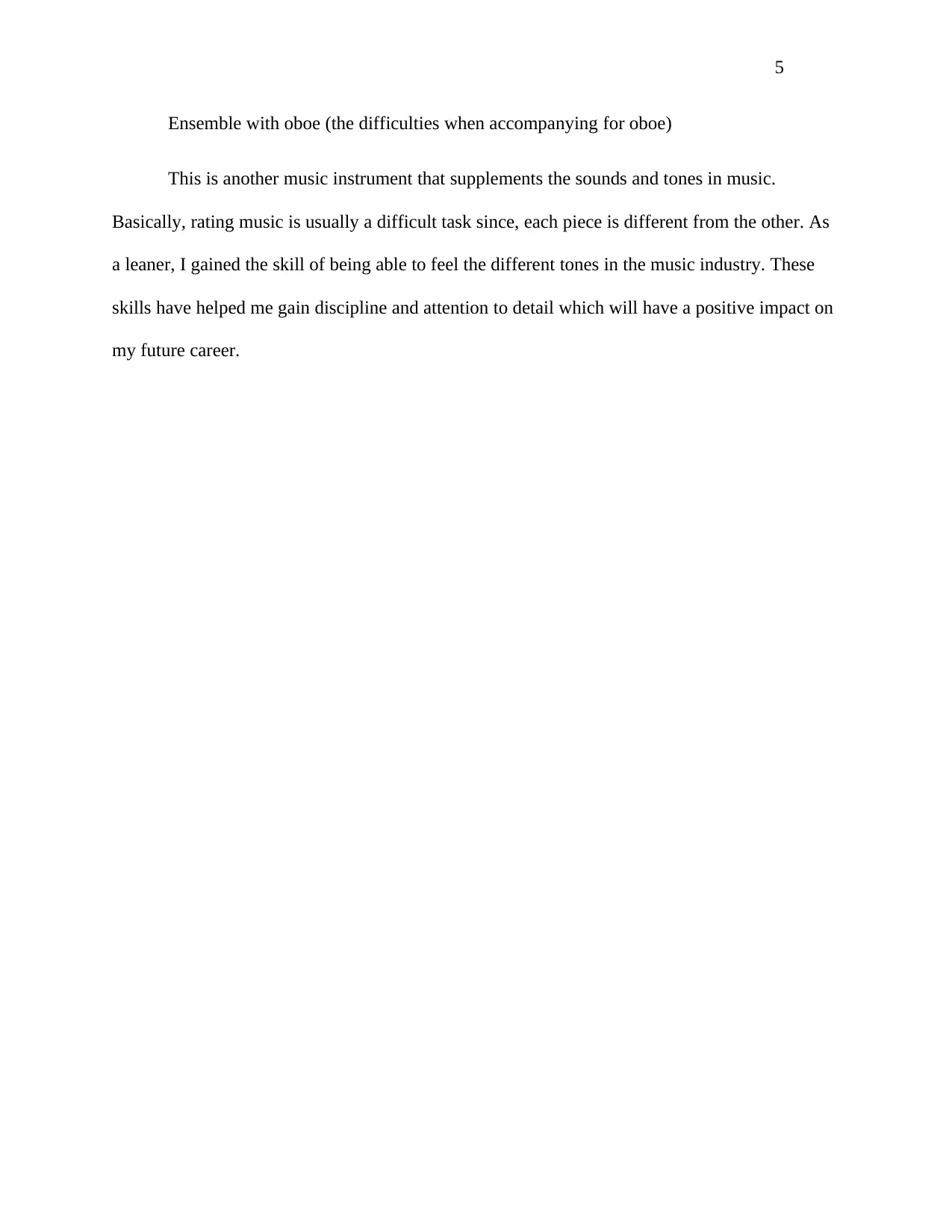
5
Ensemble with oboe (the difficulties when accompanying for oboe)
This is another music instrument that supplements the sounds and tones in music.
Basically, rating music is usually a difficult task since, each piece is different from the other. As
a leaner, I gained the skill of being able to feel the different tones in the music industry. These
skills have helped me gain discipline and attention to detail which will have a positive impact on
my future career.
Ensemble with oboe (the difficulties when accompanying for oboe)
This is another music instrument that supplements the sounds and tones in music.
Basically, rating music is usually a difficult task since, each piece is different from the other. As
a leaner, I gained the skill of being able to feel the different tones in the music industry. These
skills have helped me gain discipline and attention to detail which will have a positive impact on
my future career.
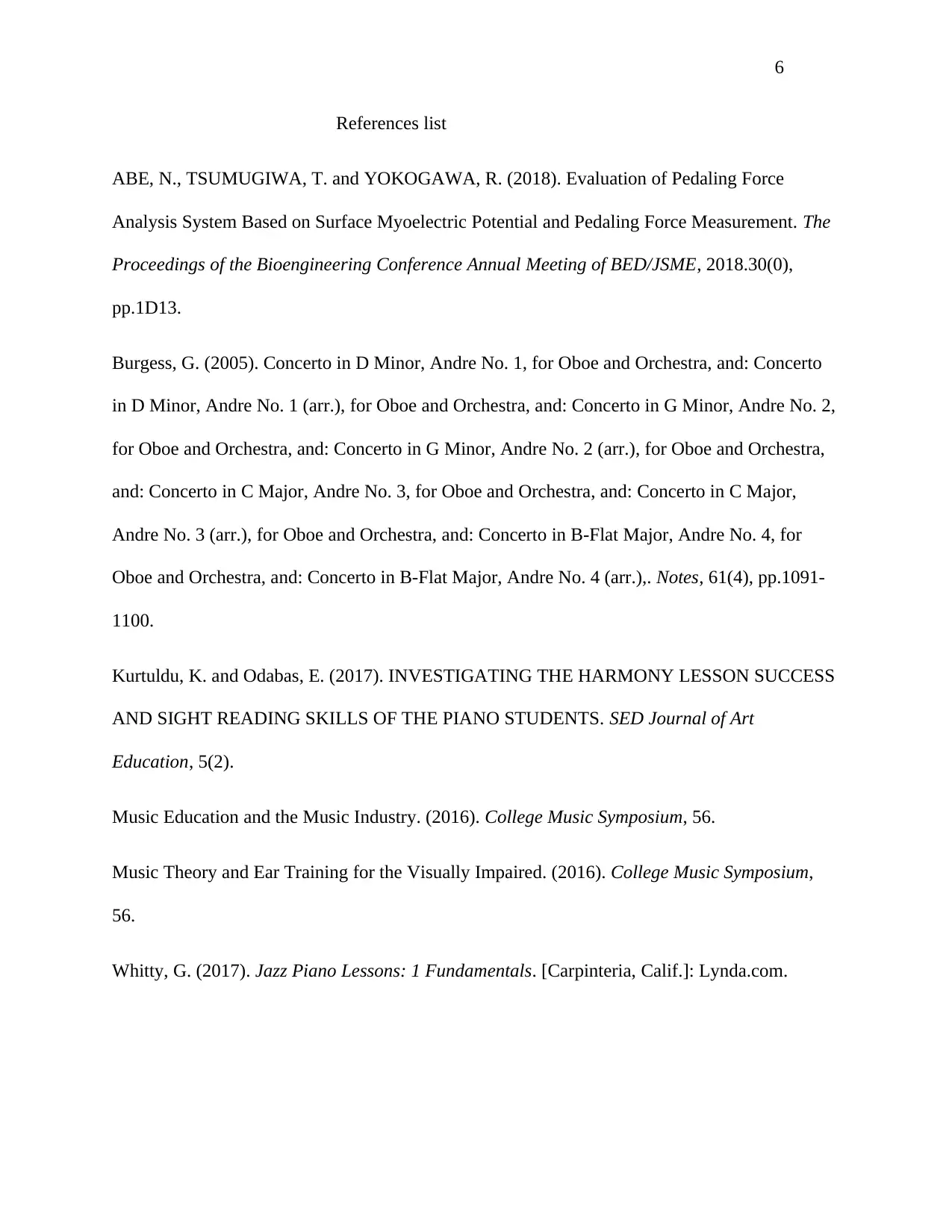
6
References list
ABE, N., TSUMUGIWA, T. and YOKOGAWA, R. (2018). Evaluation of Pedaling Force
Analysis System Based on Surface Myoelectric Potential and Pedaling Force Measurement. The
Proceedings of the Bioengineering Conference Annual Meeting of BED/JSME, 2018.30(0),
pp.1D13.
Burgess, G. (2005). Concerto in D Minor, Andre No. 1, for Oboe and Orchestra, and: Concerto
in D Minor, Andre No. 1 (arr.), for Oboe and Orchestra, and: Concerto in G Minor, Andre No. 2,
for Oboe and Orchestra, and: Concerto in G Minor, Andre No. 2 (arr.), for Oboe and Orchestra,
and: Concerto in C Major, Andre No. 3, for Oboe and Orchestra, and: Concerto in C Major,
Andre No. 3 (arr.), for Oboe and Orchestra, and: Concerto in B-Flat Major, Andre No. 4, for
Oboe and Orchestra, and: Concerto in B-Flat Major, Andre No. 4 (arr.),. Notes, 61(4), pp.1091-
1100.
Kurtuldu, K. and Odabas, E. (2017). INVESTIGATING THE HARMONY LESSON SUCCESS
AND SIGHT READING SKILLS OF THE PIANO STUDENTS. SED Journal of Art
Education, 5(2).
Music Education and the Music Industry. (2016). College Music Symposium, 56.
Music Theory and Ear Training for the Visually Impaired. (2016). College Music Symposium,
56.
Whitty, G. (2017). Jazz Piano Lessons: 1 Fundamentals. [Carpinteria, Calif.]: Lynda.com.
References list
ABE, N., TSUMUGIWA, T. and YOKOGAWA, R. (2018). Evaluation of Pedaling Force
Analysis System Based on Surface Myoelectric Potential and Pedaling Force Measurement. The
Proceedings of the Bioengineering Conference Annual Meeting of BED/JSME, 2018.30(0),
pp.1D13.
Burgess, G. (2005). Concerto in D Minor, Andre No. 1, for Oboe and Orchestra, and: Concerto
in D Minor, Andre No. 1 (arr.), for Oboe and Orchestra, and: Concerto in G Minor, Andre No. 2,
for Oboe and Orchestra, and: Concerto in G Minor, Andre No. 2 (arr.), for Oboe and Orchestra,
and: Concerto in C Major, Andre No. 3, for Oboe and Orchestra, and: Concerto in C Major,
Andre No. 3 (arr.), for Oboe and Orchestra, and: Concerto in B-Flat Major, Andre No. 4, for
Oboe and Orchestra, and: Concerto in B-Flat Major, Andre No. 4 (arr.),. Notes, 61(4), pp.1091-
1100.
Kurtuldu, K. and Odabas, E. (2017). INVESTIGATING THE HARMONY LESSON SUCCESS
AND SIGHT READING SKILLS OF THE PIANO STUDENTS. SED Journal of Art
Education, 5(2).
Music Education and the Music Industry. (2016). College Music Symposium, 56.
Music Theory and Ear Training for the Visually Impaired. (2016). College Music Symposium,
56.
Whitty, G. (2017). Jazz Piano Lessons: 1 Fundamentals. [Carpinteria, Calif.]: Lynda.com.
⊘ This is a preview!⊘
Do you want full access?
Subscribe today to unlock all pages.

Trusted by 1+ million students worldwide
1 out of 6
Related Documents
Your All-in-One AI-Powered Toolkit for Academic Success.
+13062052269
info@desklib.com
Available 24*7 on WhatsApp / Email
![[object Object]](/_next/static/media/star-bottom.7253800d.svg)
Unlock your academic potential
Copyright © 2020–2026 A2Z Services. All Rights Reserved. Developed and managed by ZUCOL.





